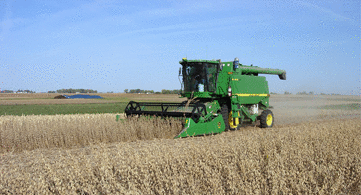当前位置:
X-MOL 学术
›
Environ. Sci. Technol.
›
论文详情
Our official English website, www.x-mol.net, welcomes your
feedback! (Note: you will need to create a separate account there.)
Fossil Energy Use, Climate Change Impacts, and Air Quality-Related Human Health Damages of Conventional and Diversified Cropping Systems in Iowa, USA.
Environmental Science & Technology ( IF 10.8 ) Pub Date : 2020-08-10 , DOI: 10.1021/acs.est.9b06929 Natalie D Hunt 1 , Matt Liebman 2 , Sumil K Thakrar 1 , Jason D Hill 1
Environmental Science & Technology ( IF 10.8 ) Pub Date : 2020-08-10 , DOI: 10.1021/acs.est.9b06929 Natalie D Hunt 1 , Matt Liebman 2 , Sumil K Thakrar 1 , Jason D Hill 1
Affiliation

|
Cropping system diversification can reduce the negative environmental impacts of agricultural production, including soil erosion and nutrient discharge. Less is known about how diversification affects energy use, climate change, and air quality, when considering farm operations and supply chain activities. We conducted a life cycle study using measurements from a nine-year Iowa field experiment to estimate fossil energy (FE) use, greenhouse gas (GHG) emissions, PM2.5-related emissions, human health impacts, and other agronomic and economic metrics of contrasting crop rotation systems and herbicide regimes. Rotation systems consisted of 2-year corn-soybean, 3-year corn-soybean-oat/clover, and 4-year corn-soybean-oat/alfalfa-alfalfa systems. Each was managed with conventional and low-herbicide treatments. FE consumption was 56% and 64% lower in the 3-year and 4-year rotations than in the 2-year rotation, and GHG emissions were 54% and 64% lower. Diversification reduced combined monetized damages from GHG and PM2.5-related emissions by 42% and 57%. Herbicide treatment had no significant impact on environmental outcomes, while corn and soybean yields and whole-rotation economic returns improved significantly under diversification. Results suggest that diversification via shifting from conventional corn-soybean rotations to longer rotations with small grain and forage crops substantially reduced FE use, GHG emissions, and air quality damages, without compromising economic or agronomic performance.
中文翻译:

美国爱荷华州传统和多样化种植系统的化石能源利用,气候变化影响以及与空气质量有关的人类健康损害。
种植系统的多样化可以减少农业生产对环境的负面影响,包括水土流失和养分流失。在考虑农场经营和供应链活动时,人们对多样化如何影响能源使用,气候变化和空气质量知之甚少。我们使用爱荷华州一项为期9年的野外实验的测量结果进行了生命周期研究,以估算化石能源(FE)的使用,温室气体(GHG)的排放,PM 2.5相关的排放,对人类健康的影响以及其他农作物轮作制度和除草剂制度形成鲜明对比的农艺和经济指标。轮作系统由2年玉米-大豆,3年玉米-大豆-燕麦/三叶草和4年玉米-大豆-燕麦/苜蓿-苜蓿系统组成。每例患者均接受常规和低除草剂治疗。与2年轮换相比,3年轮换和4年轮换的FE消耗分别降低了56%和64%,GHG排放分别降低了54%和64%。多样化减少了温室气体和PM 2.5的综合货币化损失相关排放量分别减少了42%和57%。除草剂处理对环境结果没有显着影响,而在多样化的情况下,玉米和大豆的产量和全周经济收益显着提高。结果表明,通过从传统的玉米-大豆轮换转向小谷物和牧草作物的更长轮换,可以实现多样化,从而在不影响经济或农艺性能的情况下,大大减少了FE的使用,GHG排放和空气质量的损害。
更新日期:2020-09-15
中文翻译:

美国爱荷华州传统和多样化种植系统的化石能源利用,气候变化影响以及与空气质量有关的人类健康损害。
种植系统的多样化可以减少农业生产对环境的负面影响,包括水土流失和养分流失。在考虑农场经营和供应链活动时,人们对多样化如何影响能源使用,气候变化和空气质量知之甚少。我们使用爱荷华州一项为期9年的野外实验的测量结果进行了生命周期研究,以估算化石能源(FE)的使用,温室气体(GHG)的排放,PM 2.5相关的排放,对人类健康的影响以及其他农作物轮作制度和除草剂制度形成鲜明对比的农艺和经济指标。轮作系统由2年玉米-大豆,3年玉米-大豆-燕麦/三叶草和4年玉米-大豆-燕麦/苜蓿-苜蓿系统组成。每例患者均接受常规和低除草剂治疗。与2年轮换相比,3年轮换和4年轮换的FE消耗分别降低了56%和64%,GHG排放分别降低了54%和64%。多样化减少了温室气体和PM 2.5的综合货币化损失相关排放量分别减少了42%和57%。除草剂处理对环境结果没有显着影响,而在多样化的情况下,玉米和大豆的产量和全周经济收益显着提高。结果表明,通过从传统的玉米-大豆轮换转向小谷物和牧草作物的更长轮换,可以实现多样化,从而在不影响经济或农艺性能的情况下,大大减少了FE的使用,GHG排放和空气质量的损害。











































 京公网安备 11010802027423号
京公网安备 11010802027423号